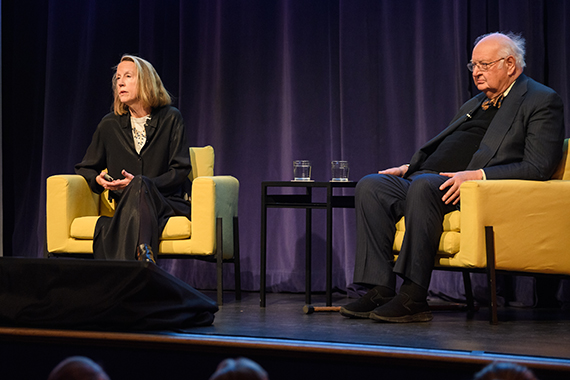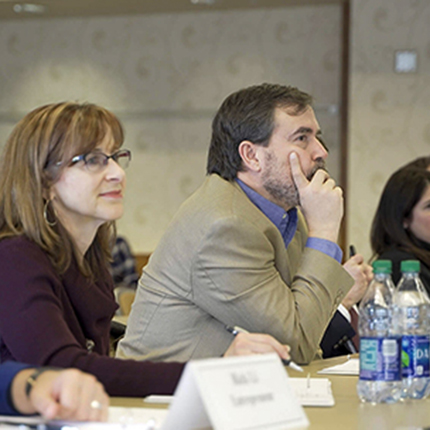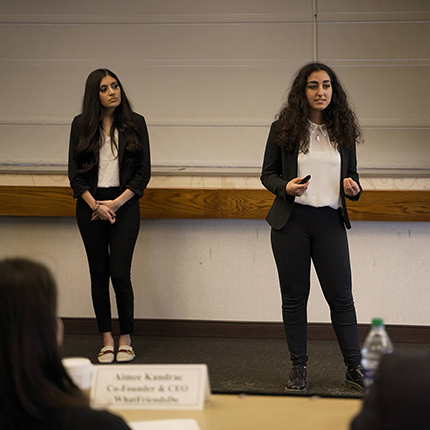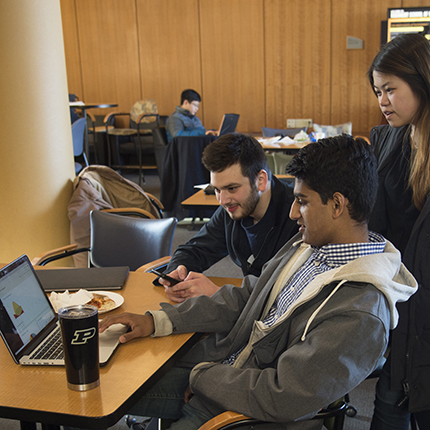 Anne Case and Sir Angus Deaton presented their lecture “Inequality, Deaths of Despair, and the Future of Capitalism” as part of Purdue’s Ideas Festival, the centerpiece of the
Anne Case and Sir Angus Deaton presented their lecture “Inequality, Deaths of Despair, and the Future of Capitalism” as part of Purdue’s Ideas Festival, the centerpiece of theUniversity’s Giant Leaps Sesquicentennial Campaign. (Photo by Rebecca Wilcox)
Deaths of Despair
Princeton economists speak on the future of capitalism at sesquicentennial event
The lack of a college education and good jobs are among the key factors driving an increase in despair and early deaths, particularly among white, working-class Americans, economics professors Anne Case and Nobel Laureate Sir Angus Deaton told a full Fowler Hall at their March lecture on “Inequality, Deaths of Despair, and the Future of Capitalism,”
Case and Deaton, both professors of economics emeriti at Princeton University, presented their lecture based on their research as part of Purdue University’s Ideas Festival, the centerpiece of the University’s Giant Leaps Sesquicentennial Campaign.
Using an array of charts with graphics, Case, the Alexander Stewart 1886 Professor of Economics and Public Affairs, Emerita at Princeton, explained the research the couple has done. After mortality rates declined through most of the 20th century, she said that began to change during the 1990s. And life expectancy in the United States has fallen for three consecutive years, 2015-2017, which had not happened since the flu epidemic in 1918.
“It’s not inequality in general that is causing rising death rates (among working-class white Americans), but the way the economy works today, which is unfair to many. It’s holding down real wages in the U.S., especially for those less educated and who do not have bachelor’s degrees,” she said. “And people also are getting away from religion and not attending church.”
Drug use, alcohol and suicide are the other part of the story, Case said.
“Three things went up significantly in the last several years — liver disease, drug overdoses and suicides. The crisis is really acute for people without bachelor’s degrees. In the U.S., suicide rates for whites is higher than in Western Europe and moving close to the rates of the former Soviet Union states,” she said.
“This is happening to both men and women … and it’s happening everywhere — rural and urban areas. And underneath the body counts, we find a sea of pain and poor mental health among people,” Case said.
Deaton, who received a Nobel Prize in economics in 2015 for his research on human welfare, then discussed the loss of jobs and how that leads to despair.
“There has been a long-term decline in workforce participation by men, especially men without a BA,” said Deaton, the Dwight D. Eisenhower Professor of Economics and International Affairs, Emeritus at Princeton’s Woodrow Wilson School. “Women were rising (in the workforce) until about 2000 and then they started declining. Once again, it’s people without a BA who don’t have good jobs. They’re dropping out of the labor force, and their wages are going down. They’re losing good jobs and getting jobs that aren’t that good.”
That leads to other issues, according to Deaton.
“The number of people with less than a BA who are not getting married is going up steadily. They’re partnering up, but they’re not getting married,” Deaton said. “And these partnerships don’t last. They end, and the people go on to other partnerships but they have kids. A majority of white moms without a BA have had a child out of wedlock. Men in their 50s may have kids, but they don’t have a bond with their families. You can see how that could make them unhappy.
“They’re losing their jobs, they’re not getting married, they’re losing their families and they’re losing religion. It’s a steady, cumulative distress for those with BAs.”






